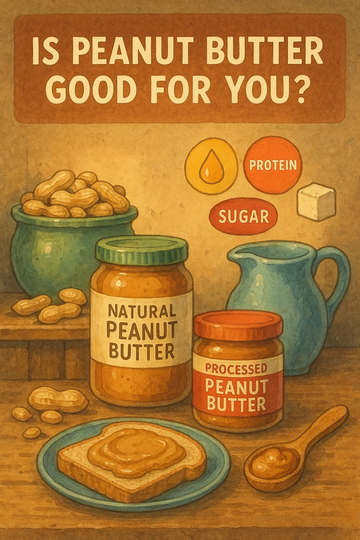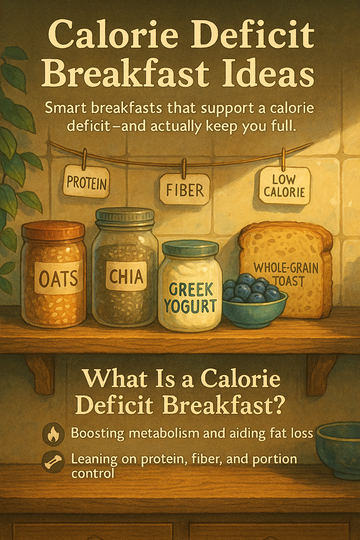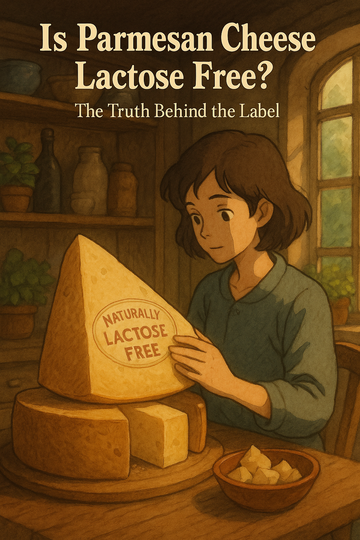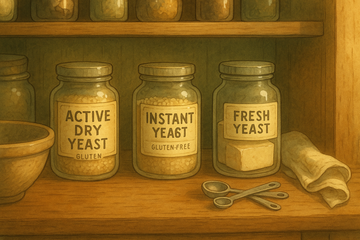Is Peanut Butter Good for You?
A Wholesome Journey Through the Heart of a Nutty Tale..
In a quiet countryside kitchen filled with warm sunlight and fluttering curtains, a tiny creature in a walnut-shell hat stirs a bubbling pot of golden peanut butter. The scent fills the air, and you can’t help but wonder:
“Is peanut butter actually good for me?”
Let’s follow this tiny kitchen spirit through the forests of nutrition, science, and history to discover the wholesome (and sometimes sticky) truth about peanut butter.
🍂 What Exactly Is Peanut Butter?
Imagine a basket of roasted peanuts crushed into a dreamy paste. That’s the core of peanut butter—ground peanuts, sometimes blended with a sprinkle of salt, oil, or sugar.
A Brief Whirl Through History
Peanut butter dates back to ancient South America, but the smooth jar we know was born in the early 1900s. George Washington Carver promoted peanuts for their soil-saving properties, and Dr. John Harvey Kellogg (yes, the cereal guy) created the first version as a health food.
🌰 Is Peanut Butter Healthy?
Like any enchanted ingredient, peanut butter has both light and shadow. It’s rich in nutrients—but can also hide surprises depending on how it’s made.
✅ The Good (Let the Forest Spirits Sing!)
-
Healthy Fats: Natural peanut butter is high in monounsaturated fats, which help protect your heart.
-
Protein-Packed: With ~8g protein per 2 tablespoons, it’s a forest hero for muscle building and hunger control.
-
Micronutrients Galore: Contains magnesium (for calm), vitamin E (for glow), niacin (for energy), and copper (for brain and blood).
🚫 The Watch-Outs (Dark Mushrooms in the Woods)
-
Added Sugars & Oils: Some commercial brands stir in hydrogenated oils and sugars—making the peanut butter more like candy.
-
Calorie Dense: Two tablespoons carry ~190 calories, so portion control is key.
-
Allergies: Peanut allergies can be severe, so fairyfolk with sensitivity must avoid completely.
🍞 How Peanut Butter Affects Your Body
For Your Heart ❤️
Natural peanut butter supports cardiovascular health due to its unsaturated fats. Studies show moderate intake may reduce heart disease risk.
For Blood Sugar 🌿
Though peanuts have carbs, their fiber, fat, and protein slow down absorption—helping avoid sugar spikes (especially when paired with whole grains or apples).
For Weight Management 🏞
Contrary to old myths, peanut butter doesn’t make you gain weight—if you don’t overdo it. It keeps you full and helps manage cravings, like a wise old owl whispering, “Snack mindfully.”
🍯 Choosing the Right Peanut Butter
In the enchanted forest of grocery aisles, which jar should you trust?
🌿 Look For:
-
Only 1–2 ingredients: peanuts and maybe salt
-
No palm oil or sugar
-
Natural or organic labels
🚫 Avoid:
-
“Reduced-fat” versions (they often add sugar)
-
Anything with long, unpronounceable ingredients
🌳 Creative Ways to Enjoy Peanut Butter
-
🐿 Spread on whole grain toast with banana coins
-
🌼 Stir into oatmeal with cinnamon and honey
-
🍃 Blend into smoothies with dates and almond milk
-
🍫 Make homemade peanut butter cups with dark chocolate
-
🥕 Dip apples, celery, or carrots for an earthy snack
🧝♀️ Who Should Be Careful?
-
Allergy-prone folk must avoid it completely
-
Kidney or gallbladder conditions? Limit it due to oxalates
-
Trying to lose weight? Enjoy in small amounts with nutrient-dense meals
🌙 Final Thoughts: A Nut Butter Worth Befriending?
In a gentle and nostalgic world, peanut butter is a little jar of wholesome comfort, rich with flavor, childhood memories and earthy strength. It's a humble helper—nutrient-dense, protein-rich, and delightfully versatile.
So yes—peanut butter is good for you, if you listen to its story, eat it with balance, and pick the cleanest, simplest versions.
A magical spoonful may just become your next favorite comfort food.







